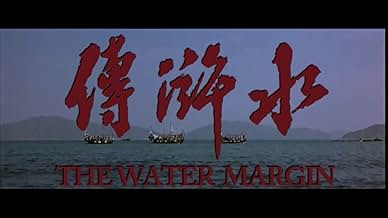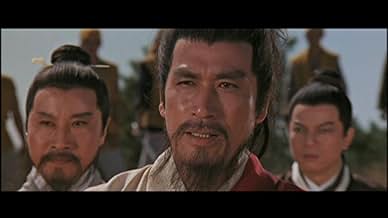Ajouter une intrigue dans votre langueSometime during the Song Dynasty, a band of martial artists form a private army to fight corruption. After trying to recruit two wealthy kung fu masters, one is arrested and sentenced to dea... Tout lireSometime during the Song Dynasty, a band of martial artists form a private army to fight corruption. After trying to recruit two wealthy kung fu masters, one is arrested and sentenced to death, and the other seeks their help for a rescue.Sometime during the Song Dynasty, a band of martial artists form a private army to fight corruption. After trying to recruit two wealthy kung fu masters, one is arrested and sentenced to death, and the other seeks their help for a rescue.
- Réalisation
- Scénario
- Casting principal
- Récompenses
- 1 nomination au total
Chen Kuan-Tai
- Tattooed Dragon Shi Jin
- (as Kuan Tai Chen)
Ku Feng
- Welcome Rain Sung Chiang
- (as Feng Ku)
Ho Bao-Hsing
- Master Tseng's Militiaman
- (as Bao-Hsing Ho)
Dik-Hak Chan
- Constable
- (as Ti-Ko Chen)
Chi-Ping Chang
- Constable
- (as Chi Ping Cheung)
Avis à la une
This movie was released in the US in the mid-seventies as Seven Blows of the Dragon as there are seven bandit warriors, though barbaric, are considered the heroes. They have names like Young Dragon (David Chiang (the only cast member I recognize), Tigress, Red Devil, etc. There are also a few "old-master" types who provide much of the drama and action.
Seven Blows of the Dragon was one of the biggest budgeted Hong Kong films of the time, and the story is a true epic scale presentation. Unlike most movies of the time inspired by Bruce Lee films, where the lone hero usually battles against bad guys with a revenge style motive, Seven Blows of the Dragon involves the old masters, the mountain outlaw band, and marauding kung fu armies, and the clash in the end features all three parties going at it, until only the old masters make for a satisfying conclusion.
The version of Seven Blows I saw was a pan and scanned cable TV print which had horrible video transfer quality. Perhaps someday the film will get an international release in its widescreen glory. The dubbing is not bad for a movie of this type. The voices are a little cartoonish, but somehow it adds to the larger than life characters portrayed in the film.
Seven Blows of the Dragon is a classic of the genre. The martial arts action is non-stop, and the film captures the flavor of ancient China. I don't believe it's currently available on video, but check your old mom'n pop videostore for a copy from the eighties. Or keep your eyes peeled on late night TV. I saw it on TNT a couple years back at 3 in the morning.
Seven Blows of the Dragon was one of the biggest budgeted Hong Kong films of the time, and the story is a true epic scale presentation. Unlike most movies of the time inspired by Bruce Lee films, where the lone hero usually battles against bad guys with a revenge style motive, Seven Blows of the Dragon involves the old masters, the mountain outlaw band, and marauding kung fu armies, and the clash in the end features all three parties going at it, until only the old masters make for a satisfying conclusion.
The version of Seven Blows I saw was a pan and scanned cable TV print which had horrible video transfer quality. Perhaps someday the film will get an international release in its widescreen glory. The dubbing is not bad for a movie of this type. The voices are a little cartoonish, but somehow it adds to the larger than life characters portrayed in the film.
Seven Blows of the Dragon is a classic of the genre. The martial arts action is non-stop, and the film captures the flavor of ancient China. I don't believe it's currently available on video, but check your old mom'n pop videostore for a copy from the eighties. Or keep your eyes peeled on late night TV. I saw it on TNT a couple years back at 3 in the morning.
First time i saw this film was back when I was 5 years old. We had it in beta format. it was titled Seven blows of the dragon. The fight scenes and weapon usage is flawless. Epic. unforgettable. Last time I ever saw this film was more than 20 years a go. Now, amazingly, it has been released on DVD in it's original title on the Shaw Brothers DVD collection. ( Everybody note, the DVD title of this film is "The Water Margin" ) I also found a sequel of this film called "All men are brothers", but it's no where near as good as this film. Rent it, enjoy it. It will definitely build you up towards one of the most intense final confrontations you've ever seen on a kung-fu movie of this kind.
It would be interesting to find out how the directorial chores were divided on this very enjoyable production. The style is consistent throughout most of the film except for some poorly shot opening scenes. Those who wince at the classic Chang Cheh red paint brutality will be relieved to know that it's limited to the very end of the film. The rest of the film is filled with good action and brisk plotting.
The film is filled with dozens of unique characters, all introduced with title cards even 90 minutes into the film. Readers of the famous book might be interested but most are useless to remember as they barely ever do anything. Fortunately the film has enough merit that you can easily watch without getting confused by the parade of introductions. The two Japanese leads are excellent as is the rest of the ensemble cast while David Chiang carries the majority of the film's personality.
There is a strong spaghetti western influence which is not a bad thing in this case. The music soundtrack seems to be entirely ripped off from other films. But the tracks stolen are mostly good, if unusual, choices.
The martial arts are frequently very good when Chiang's character is fighting. It's a version of Chinese wrestling that is not shown too often. Chuan Chen must have been the wrestling choreographer since his only other film credit is the sequel to this film. The weapon battles are early versions of the classic choreography of Liu Chia Liang and Tang Chia.
Many HK martial art dramas from this era are either too stagy or too brutal for my taste. This film strikes a good balance. Recommended.
The film is filled with dozens of unique characters, all introduced with title cards even 90 minutes into the film. Readers of the famous book might be interested but most are useless to remember as they barely ever do anything. Fortunately the film has enough merit that you can easily watch without getting confused by the parade of introductions. The two Japanese leads are excellent as is the rest of the ensemble cast while David Chiang carries the majority of the film's personality.
There is a strong spaghetti western influence which is not a bad thing in this case. The music soundtrack seems to be entirely ripped off from other films. But the tracks stolen are mostly good, if unusual, choices.
The martial arts are frequently very good when Chiang's character is fighting. It's a version of Chinese wrestling that is not shown too often. Chuan Chen must have been the wrestling choreographer since his only other film credit is the sequel to this film. The weapon battles are early versions of the classic choreography of Liu Chia Liang and Tang Chia.
Many HK martial art dramas from this era are either too stagy or too brutal for my taste. This film strikes a good balance. Recommended.
The Water Margin is the Avengers: Infinity War of Shaw Brothers movies, though I'm not sure if any other chapters of the epic story it partially adapted here were necessarily told in other movies. It still feels like getting introduced to a story that's ongoing; maybe like coming to the end of Marvel's third Phase without watching anything from the firsty 10 years of the MCU (I double down on the superhero movie comparison there, making it even more likely that I'm going to annoy someone).
I guess the comparison came to me because there are so many characters here, and even though I've only really scratched the surface of everything made by Shaw Brothers, I still recognized a ton of actors here (the movie probably gets an extra half-star for David Chiang; I just always like seeing him on screen, and he's cool/charming).
Action is okay. Pacing stays fast because of how much is happening and how many characters there are, but those qualities also make things harder to follow. It feels a little more like a drama than an action movie at times, but maybe that's a consequence of watching it a couple of days after John Woo's martial arts film Last Hurrah for Chivalry, which was probably more than 50% action; just relentless stuff.
I guess the comparison came to me because there are so many characters here, and even though I've only really scratched the surface of everything made by Shaw Brothers, I still recognized a ton of actors here (the movie probably gets an extra half-star for David Chiang; I just always like seeing him on screen, and he's cool/charming).
Action is okay. Pacing stays fast because of how much is happening and how many characters there are, but those qualities also make things harder to follow. It feels a little more like a drama than an action movie at times, but maybe that's a consequence of watching it a couple of days after John Woo's martial arts film Last Hurrah for Chivalry, which was probably more than 50% action; just relentless stuff.
If you want a great martial arts flick with unbelievable choreography check this masterpiece out well worth your time to watch and savor!!!! David Chiang shines in this movie his grace and style is a wonder to behold.Hunt this movie down now! If you enjoy any kind of action/martial arts movie you will not be disappointed!
Le saviez-vous
- AnecdotesSelected by Quentin Tarantino for the First Quentin Tarantino Film Fest in Austin, Texas, 1996.
- ConnexionsFeatured in Kain's Quest: A Better Tomorrow (2015)
Meilleurs choix
Connectez-vous pour évaluer et suivre la liste de favoris afin de recevoir des recommandations personnalisées
- How long is The Water Margin?Alimenté par Alexa
Détails
- Durée2 heures 5 minutes
- Mixage
- Rapport de forme
- 2.35 : 1
Contribuer à cette page
Suggérer une modification ou ajouter du contenu manquant

Lacune principale
By what name was 108 étoiles (1972) officially released in India in English?
Répondre

































